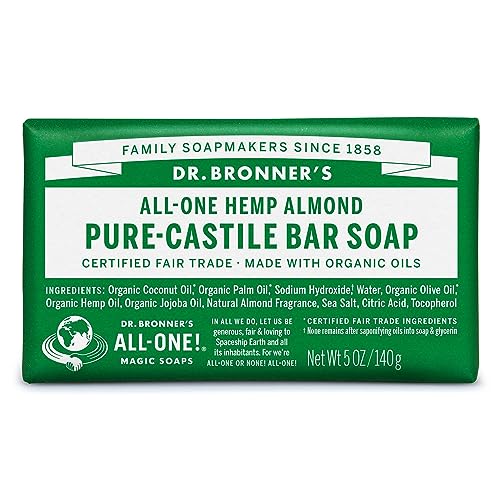
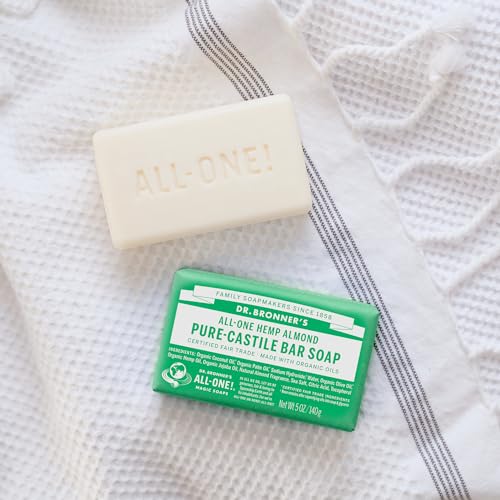
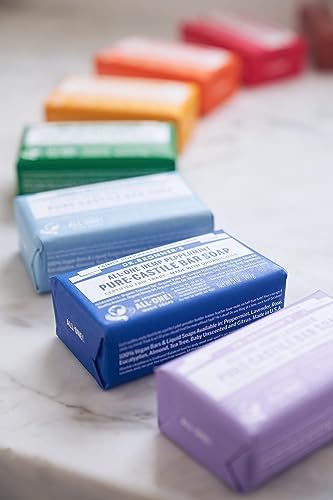
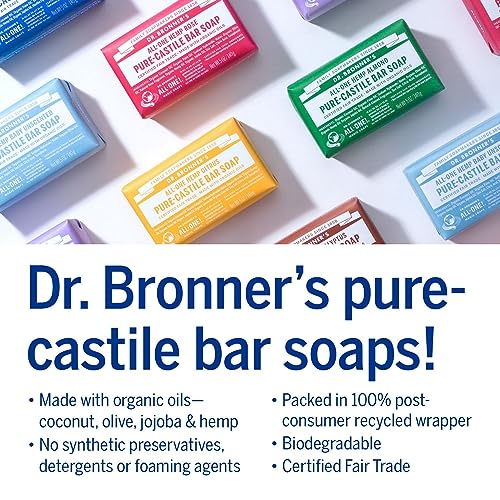
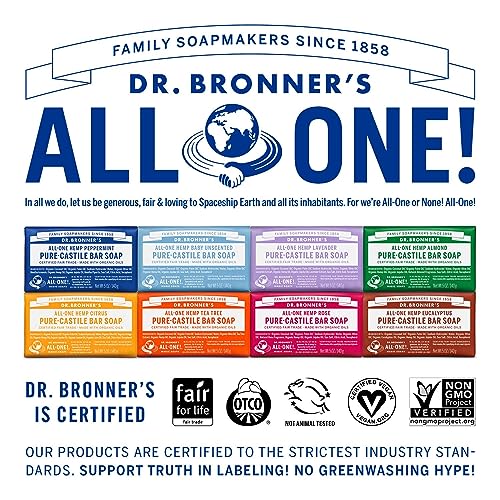
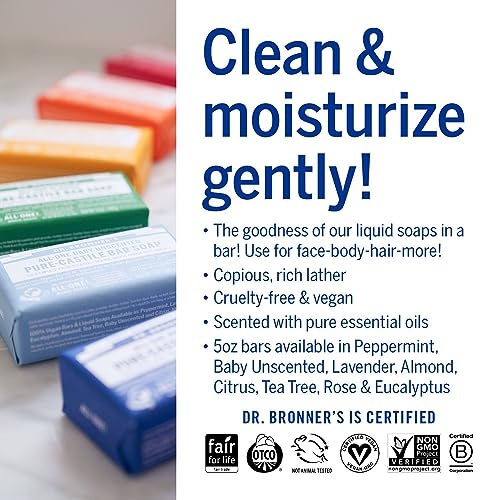
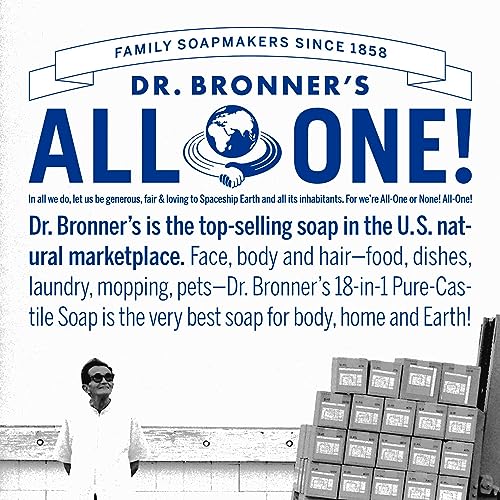
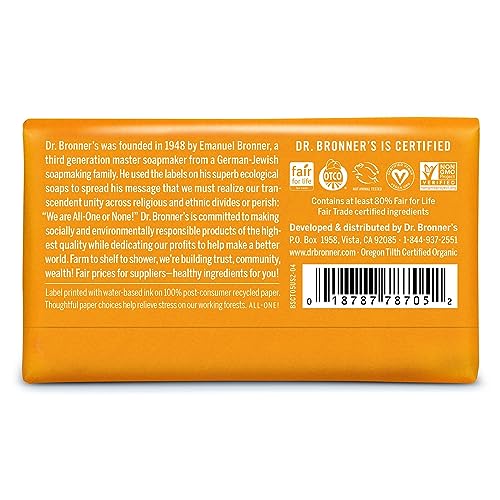
Dr. Bronner's Pure-Castile Bar Soap - Gentle Moisturizing, Organic Oils, Vegan - Almond, 5oz


Citric Acid
Medium RiskCitric acid is an alpha hydroxy acid used in personal care products primarily for its role as a pH adjuster and natural preservative. It occurs naturally in citrus fruits and is commonly utilized in various formulations for its chelating properties and mild exfoliation benefits.
Sustai Insights
Citric acid offers functional benefits as an effective preservative and pH stabilizer, contributing to product longevity and stability. It is biodegradable and derived from renewable sources. Health risks are low, with minimal concerns regarding carcinogenicity, allergies, and reproductive toxicity. However, moderate use restrictions exist due to potential irritation at high concentrations. Environmental risks are limited, as citric acid is not known to accumulate in ecosystems. Regulatory agencies have no significant advisories against its use. Overall, it is assessed as a medium-risk ingredient, with safe usage practices recommended and alternatives available.
Prunus Dulcis (Almond)
Low RiskPrunus dulcis, commonly known as almond, is a tree species in the rose family, primarily cultivated for its edible seeds. Almond oil, derived from these seeds, is widely used in cosmetics and personal care products for its moisturizing properties and skin benefits.
Sustai Insights
Almond oil offers functional benefits including skin hydration and nourishment due to its rich fatty acid content. It is generally regarded as safe with low health risks for carcinogenicity, allergies, and reproductive toxicity. Environmentally, it poses low pollutant potential and is biodegradable. Regulatory assessments indicate no significant restrictions. Overall, the ingredient is assessed to present low risk, making it a suitable choice in personal care formulations.
Tocopherol, D Alpha
Low RiskTocopherol, specifically d-alpha tocopherol, is a naturally occurring form of Vitamin E. It is commonly used in cosmetic and personal care products primarily for its antioxidant properties, helping to protect formulations from oxidation and extend shelf life.
Sustai Insights
D-alpha tocopherol provides effective antioxidant benefits, contributing to product stability. It is sustainably sourced and generally regarded as safe, with low concerns regarding carcinogenicity, allergies, and reproductive toxicity. However, there are minor concerns about endocrine disruption. Regulatory bodies have not imposed significant restrictions, indicating low overall risk. Recommended usage practices include adhering to established safe concentration thresholds. Alternatives, such as other forms of Vitamin E or plant-based antioxidants, may also be considered.
Sea Salt
Low RiskSea salt is a mixture of inorganic salts derived primarily from the evaporation of seawater. It consists mainly of sodium chloride, with minor amounts of other minerals. Sea salt is commonly used as a seasoning and preservative in food products and may also have applications in cosmetics and personal care items.
Sustai Insights
Sea salt serves as an effective flavor enhancer and preservative, contributing to the taste and shelf-life of food products. It is generally considered safe with low risk for health concerns such as cancer, allergies, and reproductive toxicity. Environmental impact is minimal, as it does not contribute significantly to pollution or bioaccumulation. Regulatory bodies, including the FDA, currently do not impose restrictions on its use. Overall, the risk level associated with sea salt is low, making it a widely accepted ingredient with no significant adverse effects reported.
Olea Europaea (Olive) Oil
Low RiskOlea europaea (olive) oil is derived from the ripe fruit of the olive tree. It is commonly used in cosmetic formulations primarily as a moisturizer and emollient due to its nourishing properties for the skin. It also serves as a carrier oil for other ingredients in formulations.
Sustai Insights
Olea europaea (olive) oil offers numerous functional benefits, including effective moisturization and enhanced skin absorption properties, making it suitable for various cosmetic applications. It is a biodegradable ingredient, contributing to sustainability when sourced responsibly. Health risks are low, with minimal concerns regarding carcinogenicity, allergenic potential, and developmental toxicity. Environmental risks are also low, with no significant bioaccumulation or pollution potential noted. Regulatory bodies do not impose restrictions on its use. Overall, olive oil presents a low risk profile, making it a favorable choice in cosmetic products.
Water
Low RiskWater is a clear, colorless liquid essential for various biological processes. It serves as a solvent in formulations, facilitating the dissolution of other ingredients and enhancing product texture and application. Additionally, water plays a crucial role in hydration and is a key component in many cosmetic and personal care products.
Sustai Insights
Water is an effective solvent and hydrator, contributing to the texture and efficacy of formulations. It is biodegradable and generally regarded as safe, with low concerns regarding carcinogenicity, allergies, and reproductive toxicity. However, excessive water usage can lead to environmental concerns, particularly regarding resource depletion. Regulatory bodies do not impose restrictions on water use in cosmetics. Overall, the risks associated with water are low, making it a safe and essential ingredient.
Simmondsia Chinensis (Jojoba)
Low RiskSimmondsia chinensis, commonly known as jojoba, is an oil derived from the seeds of the jojoba plant. It is commonly used in cosmetic formulations for its moisturizing properties, acting as an emollient and skin conditioning agent.
Sustai Insights
Jojoba oil offers functional benefits such as effective skin moisturization and is biodegradable, with sustainable sourcing practices. Health risks are low, with minimal concerns regarding carcinogenicity, allergies, and reproductive toxicity. Environmental impact is negligible, with no pollutant or bioaccumulation potential. Regulatory status is favorable with no significant restrictions noted. Overall, it is assessed as low risk, and safe usage practices should be maintained. Alternatives include other plant-derived oils like argan or almond oil, which may provide similar benefits.
Citric Acid
Medium RiskCitric acid is an alpha hydroxy acid used in personal care products primarily for its role as a pH adjuster and natural preservative. It occurs naturally in citrus fruits and is commonly utilized in various formulations for its chelating properties and mild exfoliation benefits.
Sustai Insights
Citric acid offers functional benefits as an effective preservative and pH stabilizer, contributing to product longevity and stability. It is biodegradable and derived from renewable sources. Health risks are low, with minimal concerns regarding carcinogenicity, allergies, and reproductive toxicity. However, moderate use restrictions exist due to potential irritation at high concentrations. Environmental risks are limited, as citric acid is not known to accumulate in ecosystems. Regulatory agencies have no significant advisories against its use. Overall, it is assessed as a medium-risk ingredient, with safe usage practices recommended and alternatives available.
Prunus Dulcis (Almond)
Low RiskPrunus dulcis, commonly known as almond, is a tree species in the rose family, primarily cultivated for its edible seeds. Almond oil, derived from these seeds, is widely used in cosmetics and personal care products for its moisturizing properties and skin benefits.
Sustai Insights
Almond oil offers functional benefits including skin hydration and nourishment due to its rich fatty acid content. It is generally regarded as safe with low health risks for carcinogenicity, allergies, and reproductive toxicity. Environmentally, it poses low pollutant potential and is biodegradable. Regulatory assessments indicate no significant restrictions. Overall, the ingredient is assessed to present low risk, making it a suitable choice in personal care formulations.
Tocopherol, D Alpha
Low RiskTocopherol, specifically d-alpha tocopherol, is a naturally occurring form of Vitamin E. It is commonly used in cosmetic and personal care products primarily for its antioxidant properties, helping to protect formulations from oxidation and extend shelf life.
Sustai Insights
D-alpha tocopherol provides effective antioxidant benefits, contributing to product stability. It is sustainably sourced and generally regarded as safe, with low concerns regarding carcinogenicity, allergies, and reproductive toxicity. However, there are minor concerns about endocrine disruption. Regulatory bodies have not imposed significant restrictions, indicating low overall risk. Recommended usage practices include adhering to established safe concentration thresholds. Alternatives, such as other forms of Vitamin E or plant-based antioxidants, may also be considered.
Sea Salt
Low RiskSea salt is a mixture of inorganic salts derived primarily from the evaporation of seawater. It consists mainly of sodium chloride, with minor amounts of other minerals. Sea salt is commonly used as a seasoning and preservative in food products and may also have applications in cosmetics and personal care items.
Sustai Insights
Sea salt serves as an effective flavor enhancer and preservative, contributing to the taste and shelf-life of food products. It is generally considered safe with low risk for health concerns such as cancer, allergies, and reproductive toxicity. Environmental impact is minimal, as it does not contribute significantly to pollution or bioaccumulation. Regulatory bodies, including the FDA, currently do not impose restrictions on its use. Overall, the risk level associated with sea salt is low, making it a widely accepted ingredient with no significant adverse effects reported.
Olea Europaea (Olive) Oil
Low RiskOlea europaea (olive) oil is derived from the ripe fruit of the olive tree. It is commonly used in cosmetic formulations primarily as a moisturizer and emollient due to its nourishing properties for the skin. It also serves as a carrier oil for other ingredients in formulations.
Sustai Insights
Olea europaea (olive) oil offers numerous functional benefits, including effective moisturization and enhanced skin absorption properties, making it suitable for various cosmetic applications. It is a biodegradable ingredient, contributing to sustainability when sourced responsibly. Health risks are low, with minimal concerns regarding carcinogenicity, allergenic potential, and developmental toxicity. Environmental risks are also low, with no significant bioaccumulation or pollution potential noted. Regulatory bodies do not impose restrictions on its use. Overall, olive oil presents a low risk profile, making it a favorable choice in cosmetic products.
Water
Low RiskWater is a clear, colorless liquid essential for various biological processes. It serves as a solvent in formulations, facilitating the dissolution of other ingredients and enhancing product texture and application. Additionally, water plays a crucial role in hydration and is a key component in many cosmetic and personal care products.
Sustai Insights
Water is an effective solvent and hydrator, contributing to the texture and efficacy of formulations. It is biodegradable and generally regarded as safe, with low concerns regarding carcinogenicity, allergies, and reproductive toxicity. However, excessive water usage can lead to environmental concerns, particularly regarding resource depletion. Regulatory bodies do not impose restrictions on water use in cosmetics. Overall, the risks associated with water are low, making it a safe and essential ingredient.
Simmondsia Chinensis (Jojoba)
Low RiskSimmondsia chinensis, commonly known as jojoba, is an oil derived from the seeds of the jojoba plant. It is commonly used in cosmetic formulations for its moisturizing properties, acting as an emollient and skin conditioning agent.
Sustai Insights
Jojoba oil offers functional benefits such as effective skin moisturization and is biodegradable, with sustainable sourcing practices. Health risks are low, with minimal concerns regarding carcinogenicity, allergies, and reproductive toxicity. Environmental impact is negligible, with no pollutant or bioaccumulation potential. Regulatory status is favorable with no significant restrictions noted. Overall, it is assessed as low risk, and safe usage practices should be maintained. Alternatives include other plant-derived oils like argan or almond oil, which may provide similar benefits.
Experience the gentle cleansing power of Dr. Bronner's Pure-Castile Bar Soap in Almond. Made with organic oils, this versatile soap is perfect for your face, body, and hair. Indulge in a moisturizing lather that cleans without drying out your skin.
- Moisturizing Lather: Provides a rich, hydrating lather that leaves skin soft and smooth, catering to all skin types.
- Organic Ingredients: Formulated with natural, vegan ingredients, free from synthetic preservatives, dyes, or fragrances, ensuring safety for you and the environment.
- Eco-Friendly Production: Crafted using regenerative organic palm oil, promoting sustainable farming practices that benefit farmers and the planet.
- Recycled Packaging: Packaged in 100% post-consumer recycled materials, reducing landfill waste and supporting eco-conscious efforts.
- Multi-Purpose Use: Ideal for various applications; use it for cleansing your face, body, and hair, making it a cost-effective addition to your personal care routine.
Subscribe & Save with Sustai
- Best Price Guarantee: Always enjoy the lowest prices on sustainable home essentials.
- No Surprises: We’ll notify you before shipping. No hidden fees, ever.
- You’re in Charge: Change, pause, or cancel your subscription anytime with ease.
- Eco-Friendly Deliveries: Our grouped shipments mean less packaging and lower emissions.
Join us on a sustainable journey. Special offers for a limited time! Prices and promotions may change.
Recommended Products
Experience the gentle cleansing power of Dr. Bronner's Pure-Castile Bar Soap in Almond. Made with organic oils, this versatile soap is perfect for your face, body, and hair. Indulge in a moisturizing lather that cleans without drying out your skin.
- Moisturizing Lather: Provides a rich, hydrating lather that leaves skin soft and smooth, catering to all skin types.
- Organic Ingredients: Formulated with natural, vegan ingredients, free from synthetic preservatives, dyes, or fragrances, ensuring safety for you and the environment.
- Eco-Friendly Production: Crafted using regenerative organic palm oil, promoting sustainable farming practices that benefit farmers and the planet.
- Recycled Packaging: Packaged in 100% post-consumer recycled materials, reducing landfill waste and supporting eco-conscious efforts.
- Multi-Purpose Use: Ideal for various applications; use it for cleansing your face, body, and hair, making it a cost-effective addition to your personal care routine.

You can have at most 2 Sustainable Steals products in your cart
Customer Reviews
Customers’ View
Customers appreciate the moisturizing and gentle cleansing properties of the Body Soap, noting its pleasant almond scent and rich lather. Many users highlight that it leaves their skin feeling clean without any residue, making it a suitable choice for various skin types. The soap's natural ingredients and lack of harmful chemicals resonate well with health-conscious consumers. Additionally, customers value its eco-friendly attributes, such as biodegradable packaging and sustainable sourcing of organic palm oil. Overall, the Body Soap is recognized for its effectiveness and alignment with environmentally friendly values.
AI-generated from the text of customer reviewsThis product has no reviews yet.




